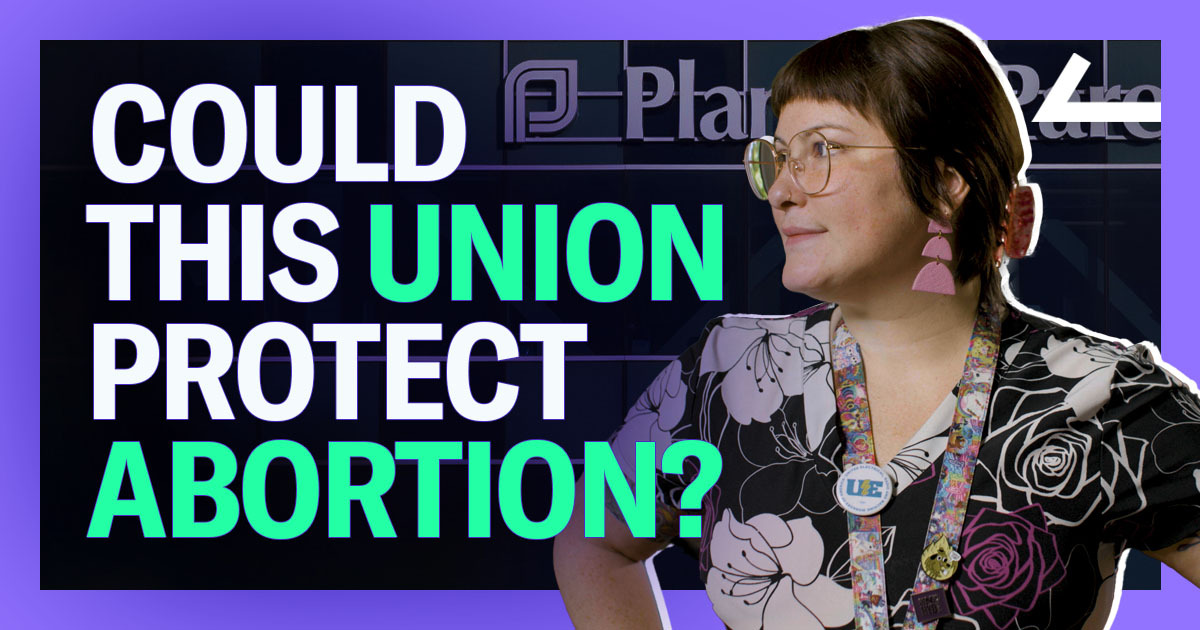Produced and edited by Libby Rainey and Meg Herschlein
Following the overturning of Roe v. Wade, Planned Parenthood workers are under tremendous stress and expecting a “tidal wave of need.” Now they’re organizing to protect and improve abortion care by ending chronic understaffing and low wages at clinics. We talked to healthcare providers at Planned Parenthood in Minnesota. Below is a full transcript of the video.
April Clark: Providing abortion care right now in this climate is terrifying. It’s exhausting.
Crystal Grabowski: Our patient volume is likely going to triple or maybe even quadruple. It’s incredibly daunting to think of the amount of patients that we’re going to need to serve.
April: Especially in the face of Roe being overturned, we need to have access to adequate staffing ratios and high quality healthcare workers right now. We need to provide care to patients, right this second.
Sadie Brewer: As the other states surrounding us lose their access to abortion care, we’re absolutely starting to see an influx now just with more Texas patients already.
April: It’s a ripple effect. When the SB8 law in Texas went into effect and all of those patients had to start going up—it’s like throwing a stone in a pond. So they’re moving up, they’re taking appointments. The people living in those states, then their appointments are coming up to other states and it just keeps going and going.
It’s really been heartbreaking to just like, look at someone’s address when we’re trying to figure out a follow-up plan, um, and being like, okay, well you live 12 hours away. So what is the plan to do your follow-up appointment?
Amy Littlefield: Access to abortion in this country has long depended on two factors: where you live and how much money you have to travel. It’s the same dynamic that’s going to just become deeper and more problematic for low-income people, for people of color, or for people who don’t have access to wealth.
Sadie: Turnover and burnout is a major problem across the entire affiliate.
Crystal: You know, you can’t provide abortion services. If you don’t have the workers.
April: In order to give the best care possible to our patients, we need someone to really have our backs and we need someone to take care of us. It’s kind of like when you’re in an airplane and they’re like, if the oxygen mask drops, put it on yourself first, you can’t save anyone else.
Sadie: Retention is not very high just because the wages are low, our schedules are very large, and our support is pretty minimal from the company itself.
Amy Littlefield: People who are making $30,000 or less per year, a lot of them are abortion clinic workers.
Crystal: At Planned Parenthood of Western Pennsylvania, our starting wage is $16 an hour for a healthcare assistant, which is not enough.
Sadie: So a lot of people aren’t staying and people that have been with the company for 10 or more years are leaving after, you know, not having their voices heard for a very long amount of time.
Crystal: We’re perpetually understaffed, and we have high patient volumes too, particularly in abortion care because there’s so few other providers in the area. So staff to patient ratios is an issue.
Jerrica Lawson: Right now, at our Vandalia St. Paul clinic, the wait times are up to three weeks for people to come in and get an abortion appointment. Three weeks is a very long time when you’re pregnant. That can be three weeks of excruciating pain, three weeks of fear, three weeks of not knowing what’s going to happen. Not to mention it completely can change the services you get.
Unionizing will help us deal with the influx of patients who are coming to Minnesota seeking abortion care because our staff will be better prepared. If our staff is cared for, then our clients will be cared for.
Amy: Reproductive healthcare workers often face a tremendous dilemma when they decide to organize. They often believe really powerfully in the missions of the organizations that they’re working for. And they know that organizations that they work for are under siege by the state, right? They know that if they work for planned parenthood, especially in an abortion-hostile state, the state is trying to ban the services they provide or strip them of funding and anti-abortion activists are often looking for any opportunity to smear the organizations that they work for.
Jerrica: I’m organizing because I believe in Planned Parenthood and I believe in reproductive justice. I don’t think we can achieve reproductive justice without economic justice, and that includes for my staff and for myself. I think we all deserve more so that we can give more to our patients.
Amy: Recently the leader at Planned Parenthood league of Massachusetts sent a letter to employees, urging them to vote no on the union. And we’ve seen organizations from the Guttmacher Institute to Planned Parenthood affiliates that have forced workers to go through a union election rather than voluntarily recognizing the union.
Crystal: Western Pennsylvania won our union overwhelmingly and we began negotiating a contract and I believe on April, 2021. And we are still negotiating our first contract. And it is more than a year later.
We’ve seen other Planned Parenthood affiliates win better wages, higher wages, annual increases and better on-call rates. Those increases are more than they would have been able to do without a union.
April: We need to be able to take breaks. We need to be able to take vacations. We need to be able to afford insurance so that we can be seen as patients. We’re not asking for anything more than what we asked for our patients.
Jerrica: My message for Planned Parenthood leadership is live your values. We believe in the human right for bodily autonomy, to have children, to not have children, to safely parent the children we have. You can’t do any of that without economic equality and economic justice.
Videography by Nadia Shaarawi



